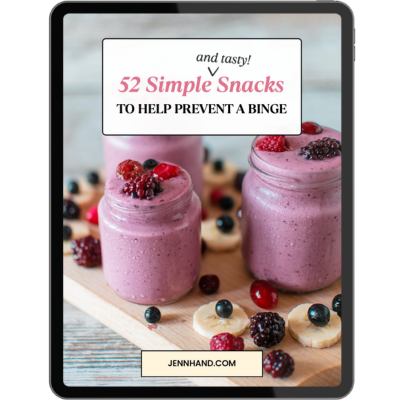Written by Jenn Hand, Holistic Nutritionist, Board Certified Health Coach, NBC-HWC
Q: “Can you eat dessert everyday and still lose weight?”
For many people, the idea of cutting out sweets entirely feels unrealistic and unsustainable. The good news is, you don’t have to say goodbye to your favorite treats to reach your weight loss goals.
In this post, I’ll explore how you can enjoy dessert regularly while still making progress and avoiding common pitfalls.
My mantra for my food coaching and emotional eating clients is “Eat balanced.”
This doesn’t mean to avoid sugar like it’s some evil life-destroying plague.
Instead, we work to find a balance between indulging in your favorite foods and also making nourishing choices that create a feeling of satiety.
Holistic weight loss isn’t about following a bazillion rules. It’s about eating balanced and learning to hear what your body needs.
Dessert and Weight Loss: Can You Have Both?
The idea of having dessert every day while losing or maintaining weight seems counterintuitive to many, but it’s absolutely possible.
My own philosophy is to have a piece of chocolate everyday. On the weekends, I typically have a treat that I really want–a homemade brownie, a cookie from a coffee shop, a piece of cake at someone’s birthday, etc. I’ve found that allowing myself a small indulgence keeps me satisfied and prevents me from going into “all or nothing” mode.
I often talk about my one-treat-per-week approach as a way to reframe dessert.
Instead of treating dessert as a guilty pleasure, I embrace it as something I mindfully choose and enjoy. I look forward to it as part of my balance, rather than something forbidden that will throw me off track.
One client of mine struggled for years with restrictive eating, believing she had to cut out sweets entirely to lose weight.
She’d do great during the week but then binge on sweets every weekend, feeling like she’d “ruined” her progress. Through our work together, we focused on mindful eating and incorporating small portions of her favorite desserts into her daily routine. Over time, her cravings balanced out, and she stopped feeling out of control.
Table of Contents
- Should You Eat Desserts While Trying to Lose Weight?
- Including Dessert Choices in Your Meal Planning
- The Importance of Satisfying Cravings
- Eating Dessert Doesn’t Make You “Bad”.
- Why I Don’t Believe in “Bad Foods”
- 4 Tips for Eating Dessert While Still Losing Weight
- Examples of Nutrient-Dense and Protein-Rich Desserts
- The Role of Fiber in Satisfying Desserts
- Strategies for Mindful Eating When It Comes to Dessert
- Common Questions
Should You Eat Desserts While Trying to Lose Weight?
The short answer: Yes, if you want to!
Incorporating desserts while losing weight can support long-term success because it prevents the restrictive mindset that leads to bingeing or overeating. When you tell yourself you “can’t” have something, what do you immediately want? The thing you told yourself you can’t have! The more we tell ourselves, no, the more it often increases the desire for that food.
This leads to a cycle of restricting and then overindulging.
Allowing yourself to have desserts creates space for moderation, where no food is off-limits. When desserts are just a normal part of your life, they lose the power they once held. Sustainable weight loss happens when you enjoy all foods without guilt, which makes it easier to stick to your goals in the long run.
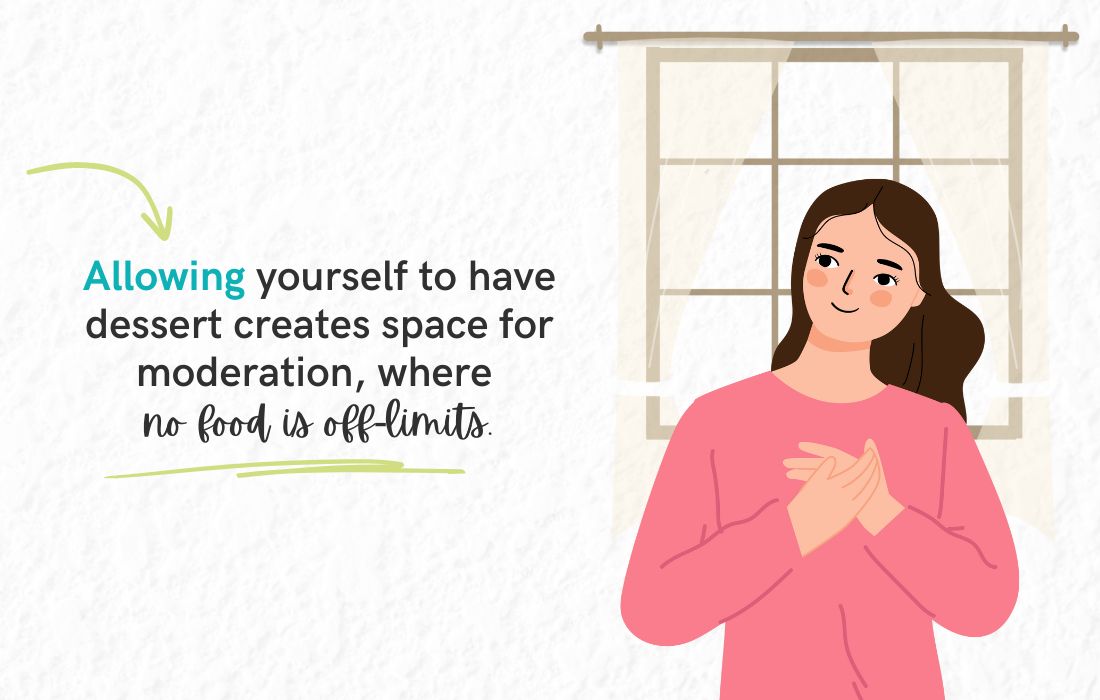
Including Dessert Choices in Your Meal Planning
When planning meals, think of dessert as part of the overall balance, rather than something extra you need to “fit in.”
Instead of seeing desserts as “bad,” you can include them in a balanced meal plan by paying attention to portion sizes and choosing foods that nourish you throughout the day.
For example, if you know you’ll want a piece of chocolate cake after dinner, plan a meal that’s both satisfying and nutrient-dense.
Maybe you eat fewer starchy carbs at dinner or eat a bit less knowing you want to have some cake after. This way, you can enjoy your dessert without feeling like you’re overindulging or depriving yourself.
Another strategy is to pick desserts you truly love. If you’re eating something you enjoy, you’re more likely to feel satisfied with a small portion. Listen to your body’s cues, and stop when you feel content, not stuffed.
The Importance of Satisfying Cravings
Ignoring cravings only leads to frustration and, often, overeating later on.
A part of this journey to food freedom with holistic weight loss is learning when to “give in” to your cravings and when it may be an emotion that may need to be addressed. If you’re constantly denying yourself dessert or any other food you crave, you may find yourself bingeing on it later when your willpower runs out.
That’s why satisfying your cravings in a mindful, intentional way is crucial.
When you acknowledge a craving and allow yourself to have what you want, you start to trust your body more. This practice helps break the cycle of overindulgence and restriction. Ask yourself what you’re really in the mood for, and enjoy that treat without guilt.
Tuning into your body’s needs fosters a healthy relationship with food. This takes courage, patience and practice.
For me, I always started very small. I didn’t allow “all” cravings, but the ones that were less scary at first. (That was bread and pasta for me and small pieces of candy.) Overtime you can build up to trusting and honoring your body’s needs without overeating or bingeing.
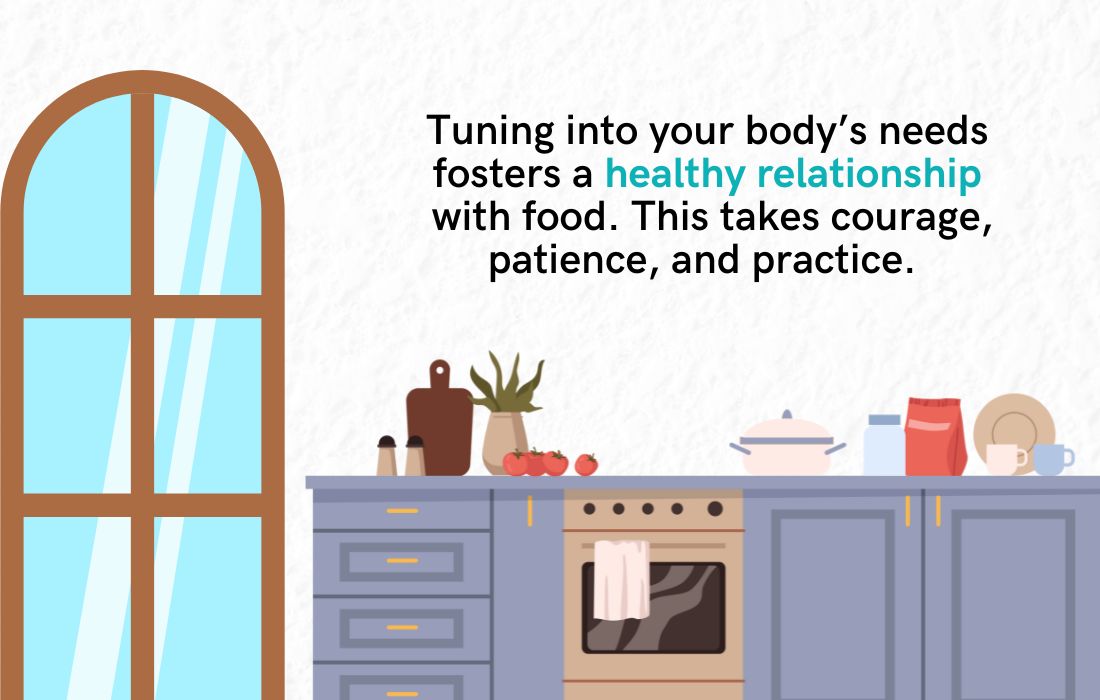
Eating Dessert Doesn’t Make You “Bad”
Many people feel a sense of guilt or shame after eating dessert, as if they’ve done something wrong.
But food isn’t good or bad like we’ve been taught in the diet world, it’s neutral. It’s about what works for OUR body. Eating dessert doesn’t make you “bad,” just like eating a salad doesn’t make you “good.” It’s worth digging into these labels to detach from this idea that certain foods are inherently right or wrong.
I often see clients who feel they need to “burn off” dessert calories by exercising, which perpetuates a damaging cycle of punishment and reward.
That was my pattern for many many years. If I ate dessert, I needed to ‘work it off.’ Instead of focusing on compensating for what you ate, practice eating dessert mindfully. Enjoy the experience, and let go of the notion that you need to earn your food through exercise or deprivation.
To develop a healthier mindset, start by giving yourself permission to enjoy food in balance without judgment.
Over time, you’ll find that food becomes just food—not something that defines your worth or requires compensation.
Why I Don’t Believe in “Bad Foods”
In my coaching practice, I don’t label any food as “bad.”
The concept of “bad foods” only feeds into the diet mentality and keeps us stuck in an unhealthy relationship with food. When we label something as bad, we attach guilt to eating it, which often leads to feelings of failure or shame.
I like to use different labels instead of good/bad.
Is the food more or less energizing? Is it more or less nourishing? Satisfying? Nutritious? There are no bad foods, only foods that serve different purposes. Some may nourish your body with nutrients, while others might bring you joy and comfort.
Both are valuable and have a place in a healthy, balanced diet.
Instead of dividing foods into “good” and “bad” categories, I encourage my clients to see all foods as neutral. When food loses its power to control you, you can make choices that align with what your body truly needs.
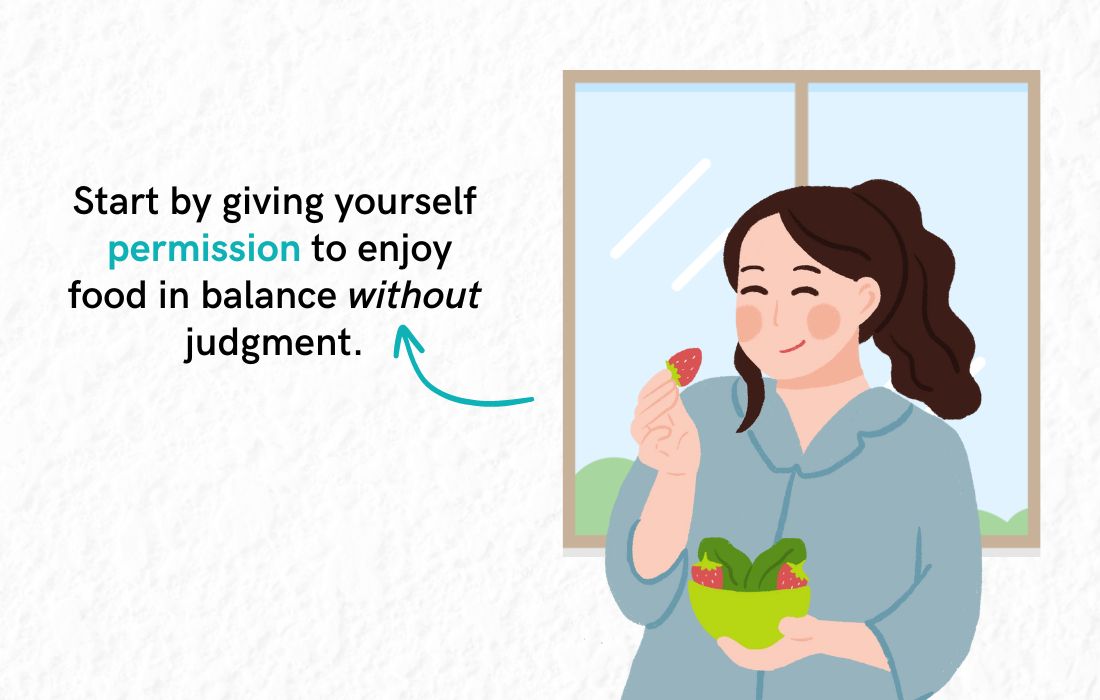
4 Tips for Eating Dessert While Still Losing Weight
It’s not about cutting out dessert entirely but enjoying it in moderation.
1 – Be mindful of how much
A small piece of your favorite cake or a few squares of chocolate can be just as satisfying as a larger portion.
When you allow yourself to indulge without overdoing it, you create a balance that supports your goals without feeling deprived.
2 -Pair Dessert with protein or nutritious fats
This helps keep blood sugar levels stable and makes you feel fuller for longer.
Pairing a small cookie with a handful of almonds or having a scoop of frozen yogurt alongside some nuts provides more lasting energy. This combination can also curb sugar cravings and prevent you from eating too much later.
3 – Choose quality ingredients
Incorporating quality foods into your desserts can help you feel more satisfied.
Have you ever tasted a Chips Ahoy cookie vs a fresh homemade one? They taste totally different! When desserts are made with quality, unprocessed ingredients you typically feel more satisfied.
4 -Mentally allow yourself to have it!
Focus on fully experiencing your dessert.
Tell yourself you are allowed to enjoy it. Take small bites, savor the flavors, and eat slowly. When you work to physically AND mentally allow it, you can eat dessert guilt-free.
Examples of Nutrient-Dense and Protein-Rich Desserts
Frozen Yogurt
Opt for plain or low-sugar varieties of frozen yogurt, and top with nuts, seeds, or fresh fruit.
Greek yogurt-based options are particularly high in protein, helping you stay fuller longer while also adding a creamy texture.
Chocolate Covered Nuts and Dark Chocolate
This is one of my go-to treats!
Dark chocolate is packed with antioxidants, and when paired with almonds, walnuts, or other nuts, you get healthy fats and protein to balance out the natural sweetness. Just a small serving can be incredibly satisfying.
Fruit-Based Desserts and Lower Sugar Treats
Desserts like baked apples, grilled peaches, or berries topped with whipped cream are delicious and satisfying without being loaded with sugar.
These options offer natural sweetness, fiber, and vitamins, which help curb cravings and support weight loss goals.
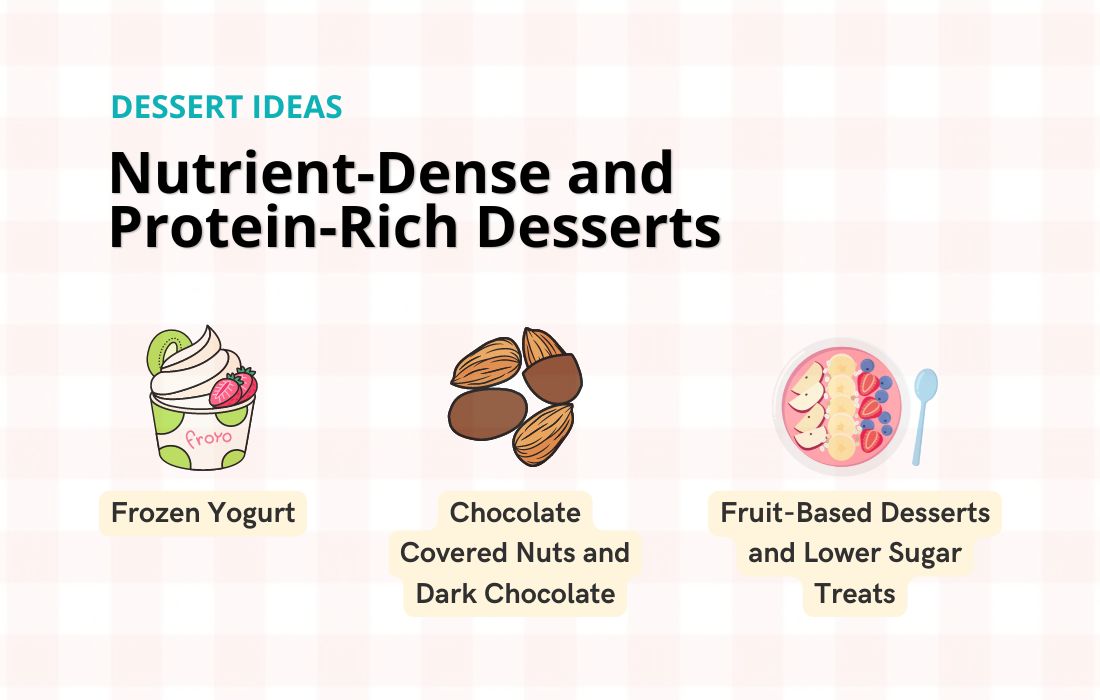
The Role of Fiber in Satisfying Desserts
Fiber helps you feel fuller longer and supports digestion, making it a valuable addition to your desserts.
Desserts with fiber-rich ingredients—like apple pie, blueberry bars, or cookies made with oats and nuts—provide more lasting satisfaction than those made with refined sugars.
Choosing real, whole ingredients also adds flavor and nutrients, so a fruit-based gelato is often more satisfying than a dessert loaded with artificial sweeteners or syrups. By incorporating fiber, you can enjoy your treats without it tipping into a binge.
Strategies for Mindful Eating When It Comes to Dessert
Mindful eating can help you enjoy dessert without overindulging. Here are a few tips to help:
- Slow down, breathe, pause and try to be present as you eat.
- Savor each bite, and focus on the flavors and textures. Enjoy the experience of the dessert.
- Avoid distractions like TV or your phone to stay present with your food.
- Take small bites and check in with yourself halfway through to see if you’re satisfied.
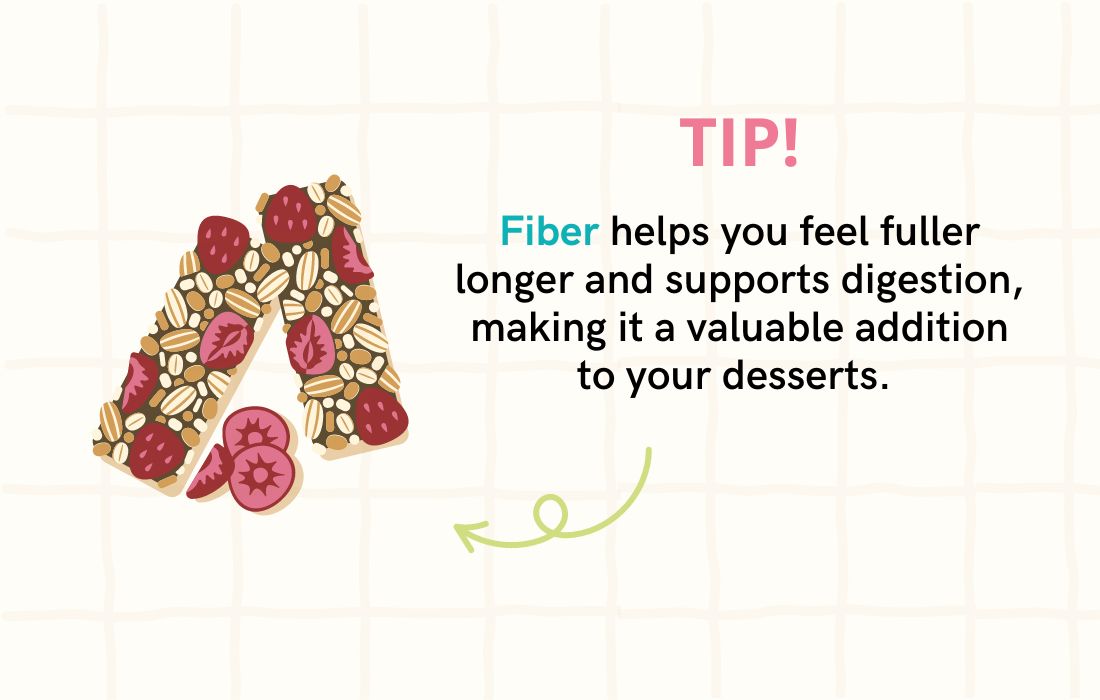
Common Questions
What are the healthiest desserts to eat while losing weight?
I’ve got 10 healthy desert options at this blog here >>
How can I satisfy my sweet tooth without gaining weight?
By balancing your meals with healthy fats, proteins, and fiber, you can satisfy cravings while managing weight.
I’m also a believer in mindful eating to help enjoy treats when you choose to have them in moderation!
What is the best way to include dessert in a weight loss journey?
Enjoy dessert in moderation and focus on “how much is enough for my body” while staying mindful of overall nourishment.
The more we tell ourselves we can’t have something, the more we want it! So explore cravings mindfully to see when it’s an emotional need or a physical need.
Are healthy fats important when trying to lose weight?
Yes, healthy fats help keep you full and satisfied, which can prevent overeating and support a sustainable way of eating.
How do I keep a balanced diet while eating dessert?
Incorporate nutrient-dense foods throughout the day and allow yourself to enjoy dessert as part of a balanced approach.
When you do have a dessert, allow yourself to fully savor it and be in the experience of eating it!
What is a healthy eating pattern that allows for treats?
An intuitive eating pattern that includes variety, balance, and satisfaction allows room for treats without guilt.
Can I successfully lose weight and still eat desserts?
Yes, you can release weight while eating desserts by practicing moderation and listening to your body’s hunger cues.
Typically, very restrictive food plans don’t last long term and end up leaving our bodies deprived.
Should I avoid desserts with saturated fat?
It’s not necessary to completely avoid saturated fat; just be mindful of how much you’re eating and how often.
Can I enjoy delicious foods and still lose weight?
Absolutely! Enjoying foods you love in balanced portions is key to making sustainable progress in weight loss.
Is it okay to eat chocolate cake if I’m trying to lose weight?
Yes, you can enjoy chocolate cake in moderation while focusing on overall balance and mindful eating.
What are some nourishing foods that satisfy sweet cravings?
Fruits, dark chocolate, and yogurt with honey are nourishing options that can satisfy sweet cravings.
I also love avocado mousse, frozen bananas with a drizzle of melted chocolate chips, and homemade popsicles in the summer!
How can I avoid blood sugar spikes when eating dessert?
Pair dessert with healthy fats or proteins to help slow digestion and prevent sharp blood sugar spikes.
Are chocolate-covered almonds a good dessert option?
Yes, chocolate-covered almonds offer a balance of healthy fats, protein, and sweetness, making them a satisfying option.
Is eating fewer calories the best way to lose weight?
Not necessarily—focusing on nourishing your body, eating mindfully, and choosing balanced meals is a more sustainable approach than simply cutting calories.
Related Articles
⚪ What Is a Healthy Dessert for Weight Loss?
⚪ How Can Anger Affect Eating Habits?
⚪ What Is Holistic Weight Loss?
Get the Normal Eater’s Newsletter
Join 8000+ women who are overcoming overeating, binge eating, and breaking up with dieting forever. Get Jenn’s inspiring and actionable weekly newsletter with the latest posts, podcasts, and tips on how to love your body, find food freedom, and lose weight holistically.
Get the Normal Eater’s NewsletterWork with an Emotional Eating & Holistic Nutrition Coach
Overcome Bingeing and Emotional Eating and Break Up with Yo-yo Dieting
Working with an emotional eating coach and holistic nutritionist can help you get free from the frustrating binge and restrict cycle and stop yo-yo dieting.
You don’t have to be obsessed with food or have a million rules around eating to find your natural weight and learn to love your body. Ready to actually see a lasting change and experience true freedom?
Schedule a 20-min CallAbout the Author:

Jenn Hand has been helping women like you become normal eaters since 2015.
She’s worked with thousands of women, helping them to balance their bodies, end bingeing, stop obsessing over food, and start feeling amazing again. As a board-certified health coach and holistic nutritionist, Jenn knows how to support you in making real positive changes that last.
Her articles have been published on Mind Body Green, Tiny Buddha, Thrive Global and other local and global media platforms. She’s the author of How to Be a Normal Eater and the creator of The Normal Eater’s Club program. Listen to Jenn’s advice and tips on the Cake Doesn’t Count Podcast, or read more of her articles for free on the Food Freedom Blog.
Learn About Coaching!





